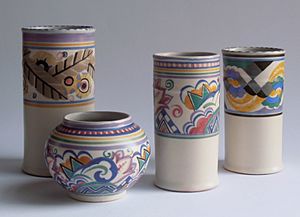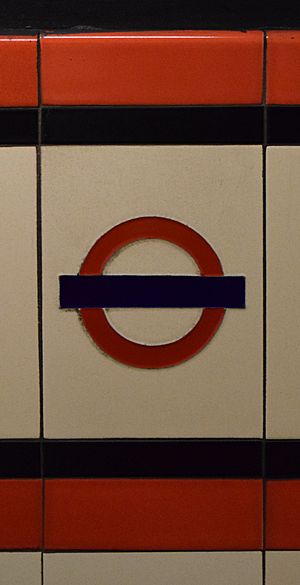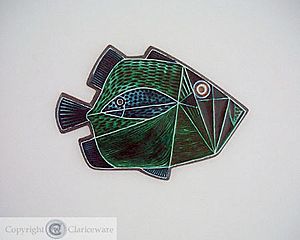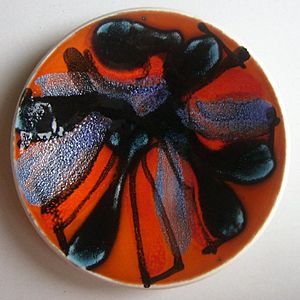Poole Pottery facts for kids
 |
|
| Owner | Denby Pottery Company |
|---|---|
| Country | Poole, Dorset, England. |
| Introduced | 1873 |
| Previous owners | 1999–2001 Orb Estates Ltd 2002–2006 Peter Ford 2006 Zemmel & Symonds 2007–2011 Lifestyle Group Ltd |
Poole Pottery is a famous British company that makes beautiful pottery. It is now owned by the Denby Pottery Company. Their products are made in Stoke on Trent, a city in Staffordshire, England, known for its pottery.
The company started in 1873 in Poole, Dorset, by the sea. They made pottery there for many years. In 1999, the factory moved to a new place in Poole. It closed down in 2006. Poole Pottery mostly made a type of pottery called earthenware. Sometimes, they also made stoneware.
You can see old Poole Pottery items in museums today. One famous place is the Victoria and Albert Museum in London.
Contents
The Story of Poole Pottery
Poole Pottery began as a company called "Carter's Industrial Tile Manufactory." This company made tiles and helped start what became Poole Pottery. In the 1920s, Mr. Carter worked with talented designers. These included Harold Stabler, Phoebe Stabler, John Adams, and Truda Adams (Truda Carter). Together, they formed "Carter Stabler Adams." This group created amazing Art Deco pottery.
The Carter company also made many of the ceramic tiles for London Underground stations. These stations were built in the 1930s. A special example is the relief tiles designed by Stabler. These tiles show symbols of London. You can still see some of them at stations like Bethnal Green.
"Carter Stabler Adams" later became "Poole Pottery." During and after World War II, they made many popular pottery lines. Two well-known ones were Twintone and Traditional. Much of the Traditional range was based on designs by Truda Carter. She was the main designer in the 1920s. Her original ideas were painted by hand by "paintresses." Each artist added their own unique touch to every piece.
Famous Designs: Delphis and Aegean
In the 1950s, Robert Jefferson joined Poole Pottery. He worked with other skilled artists. These included Leslie Elsden, who designed the "Aegean" range. Guy Sydenham created the "Atlantis" range. Tony Morris helped develop the early "Delphis" Studio wares with Jefferson. Many talented paintresses also worked there.
Together, they created two of Poole's most famous pottery lines: Delphis and Aegean.
Delphis Pottery
The Poole Delphis range started in 1963. It was first thought up by Guy Sydenham and Robert Jefferson. Later, Jefferson and Tony Morris developed it further. Delphis pottery is easy to spot. It has bright, lively colors and bold designs. These designs were inspired by famous artists like Mondrian, Warhol, Matisse, and Pollock. Every piece of Delphis pottery is unique. The decorators themselves created the designs on each item.
Aegean Pottery
The Aegean range was introduced in 1970. It uses special spray-on glazes. Artists used different techniques like sgraffito (scratching through layers) to create patterns. The patterns included abstract shapes from the 1970s. They also featured pictures of fish, leaves, boats, and country scenes. Aegean was meant to replace Delphis, but it never became as popular.
Twintone Pottery
Poole Pottery (Carter, Stabler and Adams) started making two-colored tableware in the 1930s. They had to stop during World War Two. When they started making it again in the late 1940s, they called it Twintone. This style was used on many types of tableware. It also appeared on table accessories and decorative items. Twintone was made until 1981.
Living Glaze Pottery
Today, Poole Pottery giftware is made using something called "Living Glaze." This is a special way of putting different glazes on the pottery. The glazes react with each other when heated. This creates unique and beautiful results on every single piece.
Changes and New Beginnings
In 2003, the company faced financial difficulties. It was sold to a businessman named Peter Ford. To help pay off debts, some old items from the Pottery's museum were sold.
On December 15, 2006, it was announced that the Poole shop would close. The company went into administration a few days later. This meant it owed a lot of money to many people.
However, Poole Pottery came out of administration on February 10, 2007. It was then managed by Lifestyle Group Ltd. This group also owned Royal Stafford Tableware.
The pottery shop on Poole Quay reopened. It sold Poole Pottery giftware, lighting, and tableware. This shop closed down in 2017.
The main Poole Pottery factory is now located at the Middleport Pottery in Burslem. This is in Stoke on Trent. Production moved there after the original Poole factory closed.
In June 2011, the Denby Pottery Company bought Poole Pottery.
See also
- Poole Museum (Dorset)
 | Laphonza Butler |
 | Daisy Bates |
 | Elizabeth Piper Ensley |





